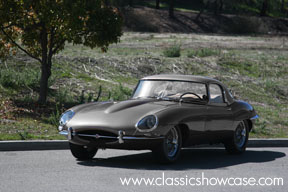1962 Jaguar-XKE Series 1 3.8 OTS
Specifications |
|
| Stock: | J62-245 |
| Current condition: | UNDER RESTORATION |
| Performance: | 3.8 DOHC In-line 6-Cylinder Engine, 265HP, Weber Carbs |
| Transmission: | 5-speed Manual |
| Suspension: | Independent Front / Rear |
| Color exterior: | Metallic Silver |
| Color interior: | Blue and Gray |
| Wheels: | D-Type Style Wheels |
| Brakes: | Front & Rear Disc |
| Vin #: | 877245 |

Description
Our team has been in the process of creating a customized, performance-based restoration to this 1962 Jaguar E-Type Roadster since the Spring of 2025. Progress continues to be made in our body shop, with the roadster just recently receiving a base coat ahead of final clear. In addition, major work on the XKE’s rear end has been completed, and the engine has now been recently installed, marking an important milestone in the build! Please stay tuned for more updates on the continued progress of this special E-Type!
Our team designed this build to enhance both performance and aesthetics while maintaining the classic spirit of the original E-Type. The Jaguar will feature an alloy dash and center console, with the front and rear bumpers removed for a cleaner, more aggressive look. It will be fitted with a lightweight alloy bonnet, D-Type-style wheels, and a matching removable hard top. The stance will be improved with 6-inch wide wheels wrapped in 205/70R15 tires. Performance upgrades include triple Weber carburetors, performance headers, a custom 2-inch exhaust system, and a Wilwood big brake kit for improved stopping power. Additional enhancements include a gear reduction starter, lightweight flywheel, aluminum radiator, electronic ignition, upgraded alternator, and period-correct fog lights. Once complete, this Roadster will offer an exceptional blend of vintage Jaguar style and modern performance upgrades, creating a standout driver-focused sports car!
History
The Series 1 was introduced, initially for export only, in March 1961. The domestic market launch came four months later in July 1961. The cars at this time used the triple SU carbureted 3.8 liter six-cylinder Jaguar XK6 engine from the XK 150 S. The early cars have leather-upholstered bucket seats, an aluminum-trimmed center instrument panel and console, and a Moss four-speed gearbox. The Series 1 can be recognized by glass-covered headlights, small "mouth" opening at the front, signal lights and tail-lights above bumpers and exhaust tips under the number plate in the rear. Jaguar's second E-Type concept was the E2A which, unlike the E1A, was constructed from a steel chassis with an aluminum body. This car was completed as a racing car as it was thought by Jaguar at the time it would provide a better testing ground. E2A used a 3-liter version of the XK engine with a Lucas fuel injection system. The "'Lightweight' E-Type" which was apparently intended as a follow-up to the D-Type. Jaguar planned to produce 18 units but ultimately only a dozen were reportedly built. Of those, two have been converted to Low-Drag form and two others are known to have been wrecked and deemed to be beyond repair, although one has now been rebuilt. These are exceedingly rare and sought after by collectors.
